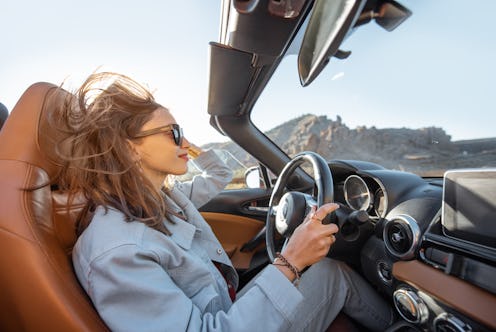Life
What Doctors Want You To Know Before You Take A Road Trip This Summer

For people unable to avoid traveling in the near future, finding ways to safely move around the country has become the new normal amidst the coronavirus pandemic. Should you fly? Take a train? Hop in the car? For those wondering how to take a road trip safely, experts have some advice on how to minimize the risk of exposure while traveling.
To be clear, there is still risk if you plan to travel. As Natasha Bhuyan, MD, family physician and west coast medical director at One Medical, tells Bustle, “We cannot definitively say that it is safe to travel right now,” noting that the level of risk depends on factors like the number of cases in your departure and destination cities.
The Center for Disease Control and Prevention (CDC) is also still currently recommending people practice social distancing and that staying home is the best way to protect yourself and others. We also don’t know if one mode of travel is safer than others, as the CDC notes. However, certain types of travel increase the number of places travelers can be exposed, like airports, bus stations, train stations, and rest stops. If you need to take a long-distance road trip in the coming weeks, here are a few things you should consider before you hit the road.
How Many Stops Do You Need To Make?
As the CDC notes, the number and type of stops you make during a road trip for gas, food, bathroom breaks, etc. increases your risk of exposure as it puts you in close contact with other people and surfaces.
Dr. Jessie Abbate, an infectious disease biologist from Virginia and research associate at the French National Institute for Development, recommends you plan ahead as much as possible to minimize your number of stops. Pack food and water so you have to stop less frequently and reduce the number of people you come in contact with. If you need to make an overnight stop, check the updated cleaning protocol of your lodging. You can consider bringing sanitation supplies like disinfectant wipes if you want to clean your lodging yourself.
It’s also not a bad idea to make sure your car is good to go before you leave. Get that oil change and tire rotation you’ve been putting off.
Are You Visiting Or Traveling With People Who Are High Risk?
If the answer is “yes,” staying home is still the safest option for you and them. This is especially true if you are traveling with someone who is at higher risk for COVID-19. In addition to increased exposure in highly populated areas, being in secluded areas poses an additional risk. As the CDC notes, if you’re taking a road trip to go camping or planning to be in another remote area, medical care may not be as easily accessible which could be dangerous should a member of your travel group become ill.
Abbate says it’s best to “avoid coming into contact with new groups of people.” For example, taking an 8-hour drive to a single-family cabin poses different risks than meeting up with a group of friends in a highly populated city where you plan to go out to restaurants, bars, etc. “It's best to keep your network small,” Abbate adds. “If you take a non-habitual cross-country trip, not only will you come into contact with a large number of people, but the identity of the people you are encountering are likely to each be unique.”
Not only does this increase your chances of encountering someone who is infected, it also makes it difficult to track down who you may have infected should you test positive. Additionally, you should assume the people at your highly-populated travel destination have also made a long-distance trip, made stops, and encountered a larger number of people, thus increasing chances of exposure even more.
Can You Postpone Your Trip?
If the answer is “yes,” it’s best to stay home. You’re probably sick of hearing this by now but it’s better to be safe. The way people are celebrating everything from birthdays to graduation to weddings has changed. If you can, reschedule that trip for a later date
Regardless of how you are traveling, you should still practice social distancing (staying at least six feet away from other people) and wear a mask when social distancing isn’t possible. Both Abbate and Bhuyan recommend bringing hand sanitizer to disinfect after you make any stops.
For those who do need to road trip, at least gas prices are really low right now. (But please, don't use that as an excuse to plan a trip.) Safe travels.
Experts:
Dr. Jessie Abbate, an infectious disease biologist from Virginia and research associate at the French National Institute for Development.
Natasha Bhuyan, MD, family physician and west coast medical director at One Medical.
This article was originally published on